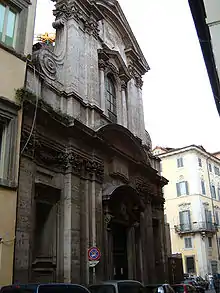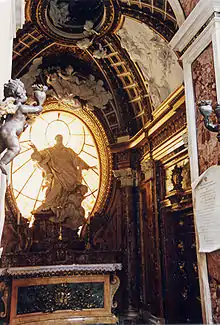San Girolamo della Carità
San Girolamo della Carità is a church in Rome, Italy, located near the Palazzo Farnese and Campo de' Fiori.

The church belonged originally to the Franciscan Observants. In 1524 it was taken over by the Archconfraternita della Carità, founded by Giulio de' Medici (later Pope Clement VII) in 1519; a society of noblemen from outside Rome. The upper nave balconies served as a first meeting place for St. Philip Neri's Oratorians founded in 1561 before they were established as a Congregation in 1575 and, in the same year, given the church of Santa Maria in Vallicella. Domenico Castello rebuilt the church in the mid 17th century.
Interior
The first chapel to the right (Cappella Spada), although originally assigned to Orazio Spada in 1575, was refurbished by Virgilio and Bernardino Spada in 1654-57. As a friend of Virgilio, the name of the Baroque architect Francesco Borromini has long been associated with the chapel but it has been argued that the overall design was probably directed by Virgilio Spada.[1] The altar rail is by Gianlorenzo Bernini's pupil, Antonio Giorgetti.

The small but superbly finished Antamoro Chapel is dedicated to S. Filippo Neri. The chapel itself was designed by Filippo Juvarra, the only work of his in Rome, and constructed in 1708-1709.[2] The decoration of the chapel with the back lit statue of The Ecstasy of S. Filippo Neri and two stucco reliefs in the ceiling was conceived by Juvarra in intimate cooperation with his close friend, the French sculptor Pierre Le Gros, who was responsible for carrying out the sculptural components.[3]
Cardinal-Deacons
- Giulio Bevilacqua, C.O. (25 February 1965 - 6 May 1965)
- Antonio Riberi (26 June 1967 - 16 December 1967)
- Paolo Bertoli (30 April 1969 - 5 March 1973)
- Pietro Palazzini (12 December 1974 - 11 October 2000)
- Jorge María Mejía (21 February 2001 - 9 December 2014)
- Miguel Ángel Ayuso Guixot (5 October 2019 – present)
References
- Anthony Blunt, Guide to Baroque Rome, 1982, p.59
- Blunt, 1982, p.60
- Gerhard Bissell, A “Dialogue” between Sculptor and Architect: the Statue of S. Filippo Neri in the Cappella Antamori, in: Stuart Currie, Peta Motture (ed.), The Sculpted Object 1400-1700, Aldershot 1997, 221-237Currie, Stuart; Motture, Peta (January 1997), The Sculpted Object, 1400-1700, ISBN 1-85928-270-9 .
| Wikimedia Commons has media related to San Girolamo della Carità (Rome). |